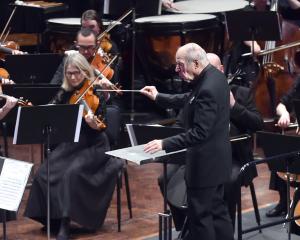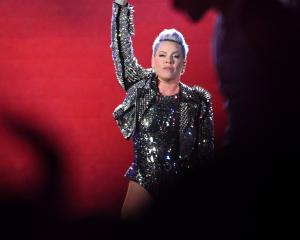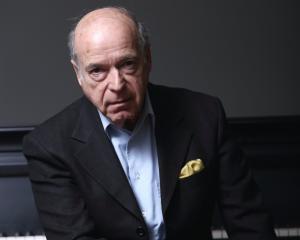Rachmaninov's second piano concerto, or ''Rach 2'' as it's known in musical circles, is the signature romantic concerto, according to Nicholas Braithwaite, who lives in Adelaide. He will be conducting it at the Southern Sinfonia's concert ''From Russia with Love'' on Saturday.
''It's the most played of all the romantic concertos except perhaps Tchaikovsky's. It's the one everyone wants to play unless they specialise in Bach or Mozart or something and it's truly one of the great works of the repertoire, rich in the most wonderful tunes.
"It's a real privilege to do it every single time, and especially with Demidenko. I've done it before with him and he's one of the world's absolutely greatest pianists - extraordinary, a towering intellect ... technically assured. He's a master,'' Braithwaite said.
Recently Braithwaite went to hear Soviet-born, UK-based Nikolai Demidenko play Scriabin with the Adelaide Symphony Orchestra and went backstage to say hello afterwards.
''He was talking to the artistic director of the orchestra and we talked about seeing each other in Dunedin in a couple of weeks. He turned to the director and said, 'that's a really good orchestra, the Southern Sinfonia. It's a real joy to work with'. He was really singing its praises, which is quite something.''
''Rach 2'', written at the turn of the 20th century, was full of the most expressive and rich melodies and sounds, he said.
''It starts with a series of slow chords from the piano that build quite quickly to a climax. The piano then sets off on a sort of march, then the strings come in with one of the best melodies ever written. It goes through that to the most quiet, contemplative stuff.
''The slow movement is gently lyrical and the last movement is notes by the million - how the pianists ever play it I don't know - and a huge climax.''
The other big Russian piece in the programme is Shostakovich's 9th symphony, which is shorter and more pithy than some of his well-known symphonies, such as the Leningrad.
Premiered in 1945, the 9th was a satirical piece, sticking out its tongue at the Stalinist regime, Braithwaite said.
Shostakovich (1906-1975) spent his life in a constant struggle with the bureaucrats of the regime. His music was subversive much of the time but it often wasn't recognised as such.
However, in 1936 Stalin went to see his Lady Macbeth of the Mtsensk District and recognised a scene with a police inspector and policeman as a satire on himself.
''He took great offence and caused the piece to be withdrawn after a very successful run and an article to be published in Pravda denigrating Shostakovich and his music.''
He was denounced several times by the powerful Union of Soviet Composers, which was allied to the Communist Party and controlled the entire music profession, from composers and performers to radio and television, music shops and music schools. Its secretary for more than 40 years was the composer Tikhon Khrennikov.
When Braithwaite was in Norway in the late 1970s, Goskontsert, the Soviet state musical and entertainment agency, organised a concert with the Oslo orchestra, forcing it to use some artists and not others.
''One of the things they forced the Oslo orchestra to do was put on a concert of Khrennikov's music, so he came to do the week's rehearsal but when he came out to conduct the concert there was not a soul in the auditorium.
"Although the orchestra's subscription series was sold out for every other concert during the year, the audience had stayed away to a man, woman and child in protest of this man Khrennikov being such a persecutor. It was a very Norwegian way of dealing with things,'' Braithwaite said.
In deciding a concert programme, the conductor and artistic director settled on a symphony and a concerto, then filled the other spot, he said.
Because it is 100 years since Benjamin Britten's birth, the orchestra has included his Four Seas Interludes from his opera Peter Grimes.
''The opera had a huge impact at its premiere in 1945. It was the first British opera of any value in the world and has held its place in the repertoire ever since. These interludes are redolent of the moods of the sea off the coast of East Anglia. They are really pictorial and very fine music.''
The fourth piece in the concert is the rarely played Elgar's Sursum Corda (Lift up your hearts), with a prominent part for the refurbished Town Hall organ.
''It's a deeply felt piece for brass and strings and the organ. I think the Sursum Corda is a real contemplation of the nobility of spirit,'' he said.
For 10 years, from 1997 to 2006, Nicholas Braithwaite was the Southern Sinfonia's principal guest conductor. His father, also a conductor, was born in Dunedin, the 20th of 22 children of Joseph Braithwaite, a bookseller who was mayor of the city in 1905.
''It's an absolute joy to return to the orchestra.
"They work so hard and get terrific results in one of the best acoustics in the world [the Dunedin Town Hall].
"And I love coming to Dunedin. I first came to Dunedin after my father died, so walking the streets he walked as a child is a wonderful experience, really,'' he said.
The concert
The Southern Sinfonia's concert ''From Russia with Love'', Dunedin Town Hall, Saturday, August 10, 8pm. Conducted by Nicholas Braithwaite, it features Rachmaninov's Piano Concerto No 2 with Nikolai Demidenko, Britten's Four Seas Interludes, Elgar's Sursum Corda and Shostakovich's Symphony No 9.












